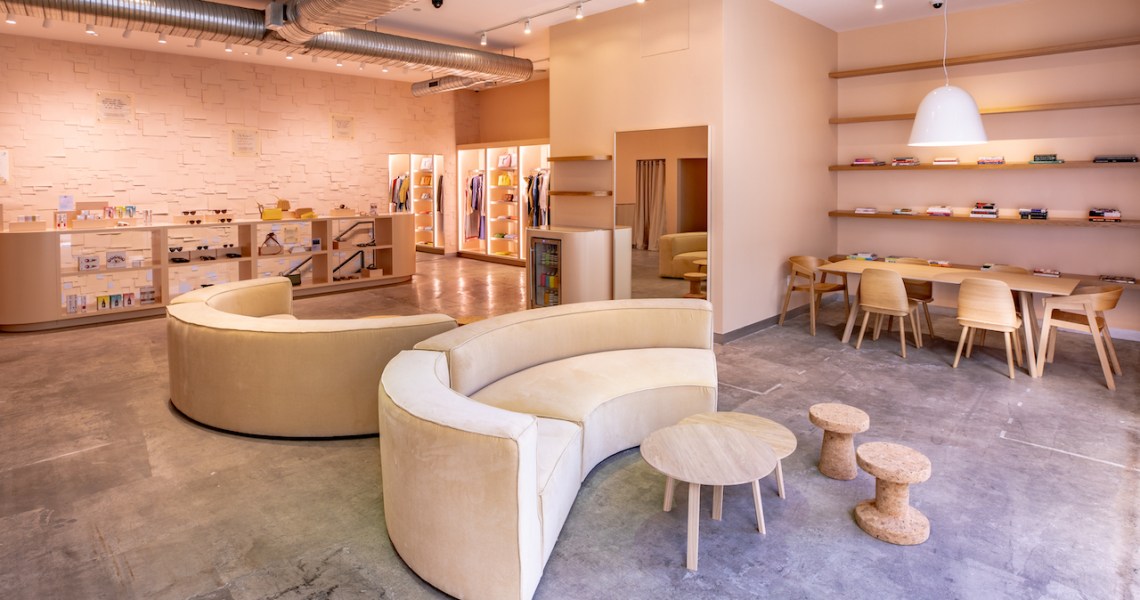The retail platform space is getting competitive.
A wave of multi-brand retail spaces for direct-to-consumer brands have popped up over the last few years, from Bulletin to Neighborhood Goods, all aimed at helping young brands experiment with physical retail while keeping costs low. Neighborhood Goods positions itself as a DTC department store, and Bulletin as a space for female-founded companies. Now Re:store, a new space in San Francisco, is hoping to stand out, not only providing by brands a space to sell (as well as a co-working space), but also by fusing technology into the IRL shopping experience and thinking carefully about brand curation and product assortment.
Re:store founder and CEO Selene Cruz created the store after turning her apartment into a showroom for her former DTC handbag brand, Archer Brighton. Cruz realized how challenging and expensive it was to have a physical retail space and to stand out on Instagram as more brands enter the space. From there, she created the concept for Re:store, which opened its doors earlier this month in San Francisco.
Re:store hopes to differentiate from other, similar retail models, by brining the best aspects of co-branded retail into one place. A carefully edited selection is a big part of that. Re:store works with brands to help them select what products will be sold in the store. Every two weeks, product assortments are refreshed and brands are shuffled around within the physical space. Re:store able provides brands with real-time sales data, similarly to Bulletin and others in the space, to help them understand what products are selling well and which ones aren’t.
“If we can help you understand what sells well in San Francisco, I think that is the most value we can provide to some of our partners,” said Cruz.
A unique selection of brands was also key to differentiating Re:store, said Cruz. She and her team hand-picked 70 brands in three different buckets: One, anchor brands that would get people in the door, like French fashion brand Sézane, H&M-owned apparel company & Other Stories and Italian-produced accessories brand Mansur Gavriel. The second bucket is cult-favorite Instagram brands, like Dirty Lemon and Lisa Says Gah, and finally, there’s local and independent brands. Left over are 2,000 other brands that are on the waitlist for space inside the three-floor, 4,200 square-foot space. Brands pay as little as $350 a month, with most signed on for three-month, or six-month leases. They also give Re:store 20% commission.
Sézane founder Morgane Sézalory said what drew her to Re:store over any other shared retail spaces was the strong female entrepreneurial spirit behind the store. Re:store is backed by Sequoia Capital’s Jess Lee, through female-driven VC group Female Founder Officer Hours. Re:store raised $1 million in pre-seed funding through Sequoia.
For Sézane, which was founded in Paris in 2013 as an online-only store and opened its first brick-and-mortar location in 2015, a space like this provides the brand a testing ground in San Francisco to see how those consumers react to the brand, Sézalory said. Currently, Sézane has stores in Paris, London and one in New York, which opened in September 2017, but it has yet to open a permanent location in San Francisco.
“San Francisco is one of our top U.S. markets online, so it has been a while that we’ve been looking to do something there. This came at a perfect time when our team and the brand were aligned and ready to take on the challenge,” said Sézalory.
Another big get for Re:store was & Other Stories. The H&M brand has a large customer base in San Francisco, but had no plans to open a brick-and-mortar location in the area, said Alyssa Coscarelli, influencer (@alyssainthecity) and former head of fashion at Refinery29 who helped curate the 70 founding brands for Re:store.
“The aesthetic angle was really important in conversations with these brands. We wanted them all to fit into that Instagram, aspirational aesthetic. Even something as simple as our dog leashes and a doggie bag carriers are beautiful. With some of the other similar retail models I’ve seen in New York, the aesthetic is all over the place. It’s not really streamlined, so we really kept that in mind with the curation of Re:store,” said Coscarelli. She will keep working with Re:store in the future, as brands will cycle in and out of this location.
Another point of differentiation is Re:store’s use of technology to connect customers with brands. Inside the space, Re:store has oversized iPads placed on the walls where customers can click on each brand, read about the brand’s story and why they were chosen to be featured in Re:store, read customer reviews, and sign up for brand mailing lists, providing customer data including email addresses, names and more. Each brand has a personalized experience built by Re:store on an iPad for customers, similarly to how retail-as-a-service platform B8ta works with its partners to showcase each featured brand’s story.
“Usually when you are partnering with a wholesaler, you’re not able to see who is walking in, who interacted with your product, who returned it. You’re not getting that type of information, which is really valuable when you’re thinking about planning out your next inventory. When a brand gets started on Shopify, on day one, they get analytics. Shopping in physical retail should be no different,” said Cruz.




